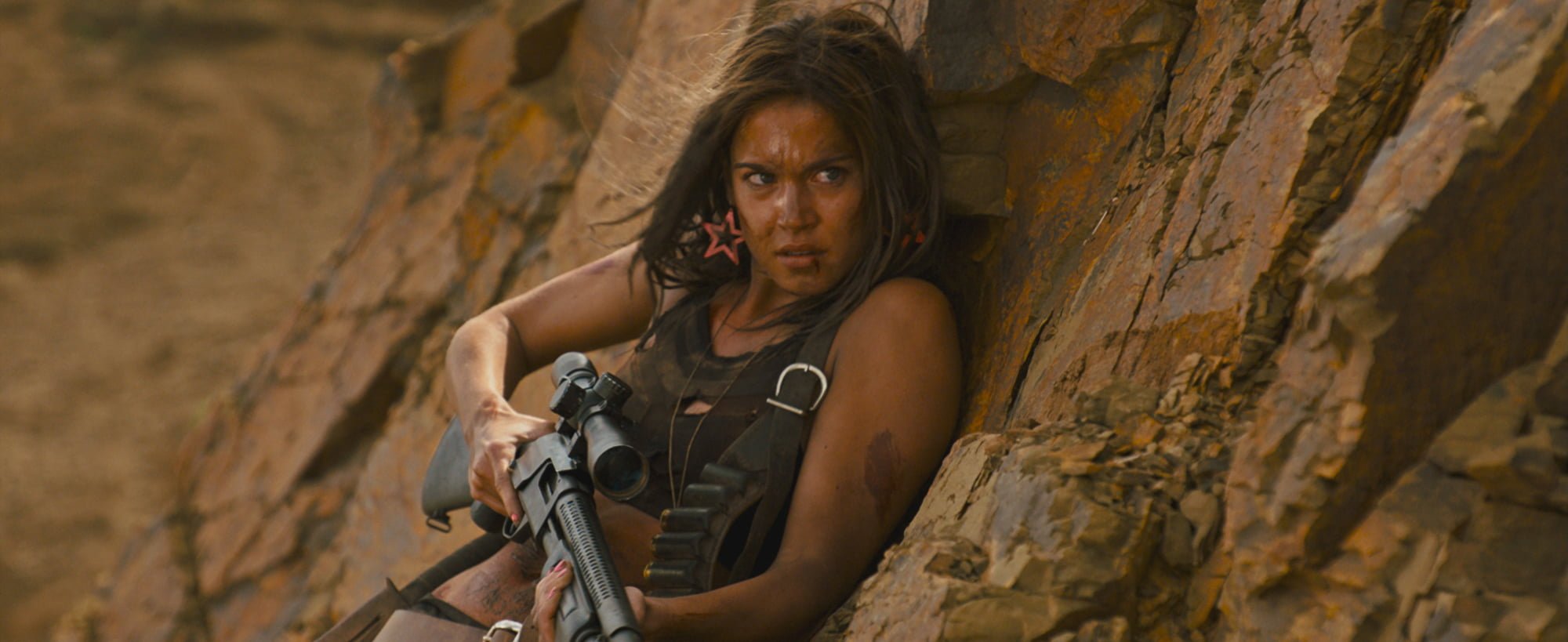Brutal, intense, and elegantly composed French filmmaker Coralie Fargeat’s debut feature Revenge breathes energy and depth into a dubious sub-genre of thriller that’s been on life support since the 1980s. A fresh, feminist take on the oft disreputable and nasty “rape revenge” thriller, writer-director Fargeat’s film showcases remarkable vision, patience, and way with metaphor that packs an emotional and intellectual wallop along with the stomach churning thrills and peril that genre hounds will devour as if it were covered in drug laced candy.
Wealthy lothario Richard (Kevin Janssens) takes off in his helicopter with his mistress, Jen (Matilda Lutz), and whisks them away to his opulent, but secluded desert bungalow. Expecting a quiet week of no frills sex and time away from his wife and kids, Richard’s plans are thwarted by the unexpected early arrival of a pair of hunting buddies, Stan (Vincent Colombe) and Dimitri (Guillaume Bouchède). Both of the men are as sexually intrigued by Jen as Richard, and one day while Richard leaves for a couple of hours, Stan takes things too far and brutally rapes Jen after his advances are rebuffed. When Richard finds out what happened, he panics, thinking that Jen’s desire to report the incident and leave the desert compound could ruin his marriage. Richard concocts a scheme to kill Jen and erase any trace that she was with them. But like most films in this genre, Richard and his cronies don’t bother to check and see if Jen is dead after their attempted murder, and with the help of enough peyote “to take out a football team” that she had stashed in a locket, the victim turns the tables on her attackers and a cat and mouse game ensues across the desert.
All “rape revenge” films have generally the same set up: there’s the establishment of the woman as a sexually capable being, a betrayal of trust, an attack, an attempt to silence or kill the victim of the rape, and the revenge portion that generally takes up the final two-thirds of such a film’s running time. Revenge doesn’t reinvent that wheel, but Fargeat is smart enough to know that the difference between a nasty thriller with something to say and a piece of exploitative trash is in the details. While many of Fargeat’s stylistic choices are straight out of the playbook of many modern filmmakers attempting to redeem similarly disreputable genre fare of the 1970s and 80s, she’s always keen to embrace her film’s more formal flourishes while delivering a subtle, timely message about rape culture via one of the most testosterone driven horror sub-genres.
Before her attacks, Jen talks about how much she’ll love returning to Los Angeles, even sporting an “I [heart] L.A.” t-shirt to underline her belief that a better life awaits her there. Although Revenge was produced and originally screened last fall at the Toronto International Film Festival just as the allegations of Hollywood improprieties and cover-ups was yet to reach its greatest heights, it’s hard not to read this as a keen bit of prescience on the part of Fargeat. More to this point, the actual rapist of Jen is portrayed to be the biggest coward of the bunch, while the man who witnessed the rape but kept things quiet (Dimitri) and the man who seeks to actively cover-up the act (Richard) are shown as bigger threats to our heroine. If that isn’t one of the most direct indictments of rape culture in all of its biggest facets, I don’t know what is.

Fargeat’s storytelling sensibilities are a bit longwinded, and at nearly two hours in length, Revenge is a touch too long for its own good. But despite the length, it’s refreshing to see a filmmaker like Fargeat displaying a mastery over knowing when to speed up or slow down a sequence. Some moments of tension are played out wordlessly and longer than expected, sometimes paying off and sometimes never going anywhere. Not every scene is needed, but none of them are without something to admire amid the carnage.
When the film has to slip into a trippier gear and Jen’s hallucinations start kicking in, Fargeat’s way with juxtaposition and symbolism (including exceptional, repeated uses of the off-primary colours pink, aqua, and goldenrod) are employed with a light touch, and not too heavy-handedly. The score alternates betweens synths, classical movements, and straight up rock and roll, but it’s always tailored to the needs of a scene, and never used to distract or to become too catchy as to overpower what’s happening on screen. Although there’s plenty of extreme gore (including a painful foot wound cleverly designed to look like a vagina) and a harsh tone, Revenge is a film that has been made with purposeful moderation, despite a message that places restraint furthest from the mind. Fargeat knows exactly what she wants to say with Revenge, and exactly how she wants to say it.
The acting is certainly passable for the genre, with Lutz’s physicality and Colombe’s sweaty, worminess emerging as standouts, but this is hardly an actor’s showcase. They’re all here to service Fargeat’s menacing, sun drenched vision. By the time the blood streaked, uncomfortable, and riveting final showdown occurs, most viewers (who have the stomach to stick with a story this harsh to the bitter end) will have forgotten about the performances and begun to revel in the filmmaking acumen displayed by Fargeat. Revenge isn’t only one of the best efforts produced within a dubious cinematic sub-set, but the heralding of another major filmmaking talent demanding to be noticed and taking no prisoners in the process.
Revenge opens in Toronto (Cineplex Yonge and Dundas), Vancouver (Rio), and Montreal (Cinéma du Parc) on Friday, May 11, 2018. It will also be available on iTunes and VOD the same day.
Check out the trailer for Revenge:
Join our list
Subscribe to our mailing list and get weekly updates on our latest contests, interviews, and reviews.

